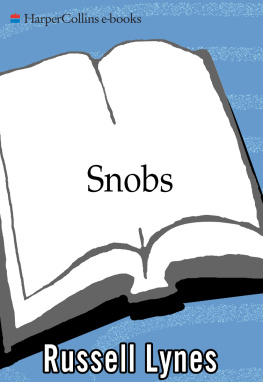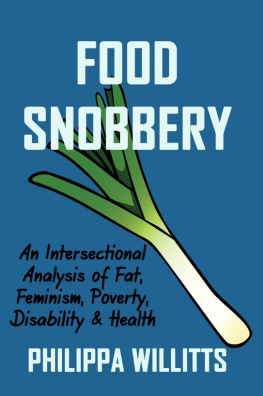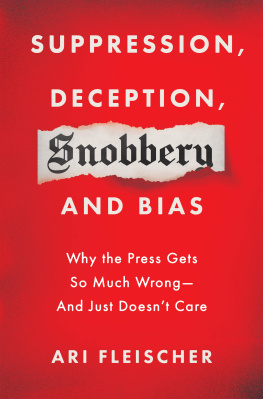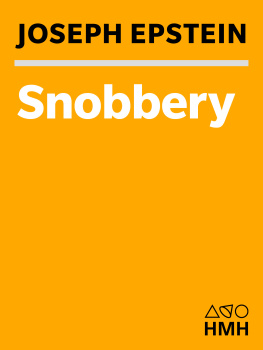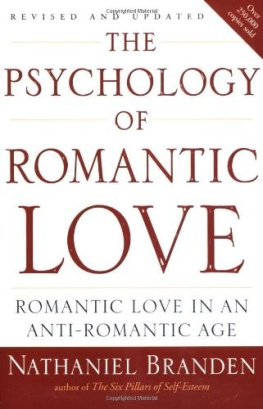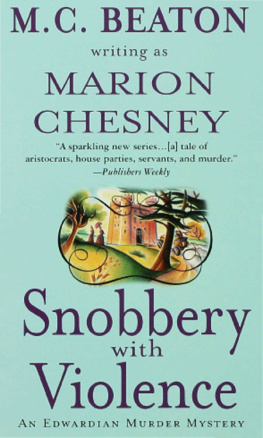Snobs
To the memory of my grandfather, a fine Snob of the
old school, and of my parents, confused and inconsistent
Snobs, who nevertheless aroused my interest in the Snob
phenomenon. So its all their fault.
The Canadian Book of
Snobs
Victoria Branden

Copyright Victoria Branden 1998
All rights reserved. No part of this publication may be reproduced, stored in a retrieval system, or transmitted in any form or by any means, electronic, mechanical, photocopying, recording, or otherwise (except for brief passages for purposes of review) without the prior permission of Hounslow Press. Permission to photocopy should be requested from the Canadian Reprography Collective.
Hounslow Press
A Member of the Dundurn Group
Publisher: Anthony Hawke
Editor: Erich Falkenberg
Design: Scott Reid
Printer: Webcom
Cover illustrations: Ruth Stanners
Canadian Cataloguing in Publication Data
Branden, Victoria
The Canadian book of snobs
ISBN 0-88882-199-9
1. Snobs and snobbishness. I. Title
BJ1535.S7B72 179.8 C98-931577-0
1 2 3 4 5 EF 02 01 00 99 98

| We acknowledge the support of the Canada Council for the Arts for our publishing program. We also acknowledge the support of the Ontario Arts Council and the Book Publishing Industry Development Program of the Department of Canadian Heritage. |
Care has been taken to trace the ownership of copyright material used in this book. The author and the publisher welcome any information enabling them to rectify any references or credit in subsequent editions.
Printed and bound in Canada.

| Printed on recycled paper. |
Hounslow Press
8 Market Street
Suite 200
Toronto, Ontario, Canada
M5E 1M6
Hounslow Press
73 Lime Walk
Headington, Oxford
England
OX3 7AD
Hounslow Press
2250 Military Road
Tonawanda, NY
U.S.A. 14150
CONTENTS
Ridentem dicere verum
Horace, First Satire.
To speak the truth with a smile.
PART 1
A Brief History of Snobbery,
its Origins and Development;
A Tentative Theory of Snobbery.
(Specifically Canadian applications in )
Introduction, or Apology
The urgent, the most burning need in Canada today is for an exhaustive study of the Snobphenomenon.
It is much more difficult to be a Snob of any distinction in Canada than, for example, in Britain or the eastern seaboard of the U.S., where snobbery has flourished for centuries. There has of course always been some small scale snobbery here, but it has been undistinguished until recent times, when it has begun to show signs of flourishing, particularly sexual snobbery.
I became aware of this when, searching my bookshelves for something else, I came across Thackerays The Book of Snobs, published in 1847; original title, The Snobs of England. An hour later I was still sitting there, mesmerized, my original project forgotten. Its coruscating brilliance is undimmed, but theres no denying that its a trifle out of date. Some of Thackerays snobs are characterized by such behaviour as picking their teeth with a fork, or eating peas with a knife. Why a knife, for pitys sake? Surely hopelessly ill-adapted for eating peas? Because in Thackerays day, two-pronged forks were still in general use in England, and it was only by living on the Continent where the usage of the four-prong is general that one was able to eat peas gracefully with a fork: the four-pronged much more efficient than a knife. This in itself is distinguished Snob stuff, as it combines etiquette snobbery with a display of cosmopolitan one-upmanship i.e. familiarity with continental manners, still a good method of establishing superiority. While historically interesting, fork-abuse is no longer a significant Snobindicator.
I recognized my mission at once. I must take up the torch laid down a century and a half ago by my great predecessor, whose obsession I have inherited. He says,
I have long gone about with a conviction on my mind that I had a work to do a Work, if you like, with a great W.; a purpose to fulfil; a chasm to leap into; a Great Social Evil to Discover and to Remedy. It has Dogged me in the Busy Street; Seated Itself By Me in the Lonely Study; Jogged my Elbow as it Lifted The Wine-cup at the Festive Board; Pursued me through the Maze of Rotten Row; Followed me in Far Lands... it Nestles in my Nightcap, and It Whispers, Wake, Slumberer, thy Work Is Not Yet Done. Last Year, By Moonlight, in the Colosseum, the Little Sedulous Voice Came To Me and Said,... this is all very well, but you ought to be at home writing your great work on SNOBS.
That same little sedulous voice now speaks constantly in my ear, though its idiom has perhaps lost a little of its elegance and most of its capital letters, and acquired a Canadian accent.
Hey, says the little sedulous voice, get with it, eh? Plenty of people have written about British and American snobbery. Someone should take a swing at Canadian snobs. Since then it has been my Vocation, my Rope and my Scaffold, my Bread and my Board, my Wound and the Salt in it. (The foregoing list is stolen from another neglected masterpiece. A very valuable but inexpensive prize will be awarded to anyone successfully identifying the source.)
A small troubling item: Thackerays title page reads,
The Book of Snobs (By One of Themselves)
This led to an agonizing self-examination. Can I possibly be a snob? The answer, as it so often seems to be, is We-e-e-ll, yes and no. Obviously, it depends on ones definition of a snob. Thackeray ducks it, to some extent, though at one point he says, He who meanly admires mean things is a snob. Still, although a self-designated Snob, he clearly doesnt meanly admire mean things, and neither do I. You wont catch me meanly admiring mean things, boy.
The reference to forks indicates that the word (Snob, not forks) has changed its meaning over the years; the fork-mishandlers were clearly lower orders, probably trying to crash a higher level and making themselves ridiculous in so doing. Dictionaries usually start with the obsolete definition of a snob as a cobbler or shoemaker, and go on to identify it as Cambridge slang, meaning a townsman (hence, in a later idiom, non-U) rather than a gownsman (U), adding grudgingly, A person belonging to the lower classes of society; one having no pretensions to rank or gentility; a vulgar or ostentatious person. These are unhelpful designations, because everyone has pretensions to rank or gentility. Scratch the most unprepossessing of unwashed drunks, and blue blood will flow: absolutely everyone is descended from exalted aristocrats, who have (to borrow the vernacular, I am a Wordsnob) got done out of their rights.
Nevertheless, the word is frequently used quite differently, to suggest connoisseurship, sensitivity to beauty, expertise in a difficult art, see Wordsnob reference, supra. This is usually what is implied when someone prefaces a remark in tones of laughing self-deprecation, Im afraid youll think me a terrible snob, but... So, though I cant define a snob yet, I have tentatively identified at least one purpose of snobbery:
Next page

